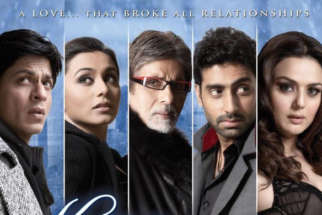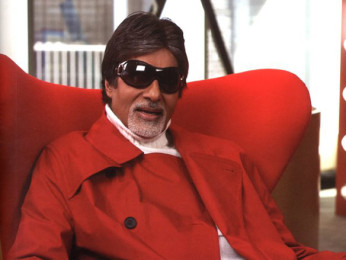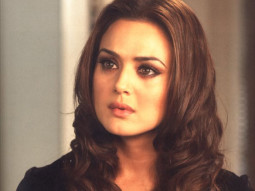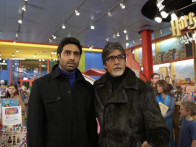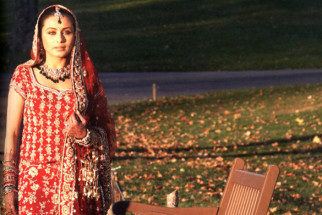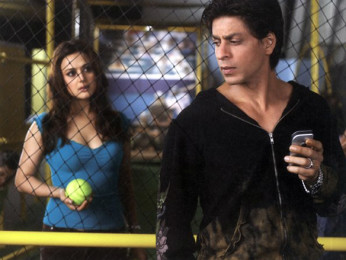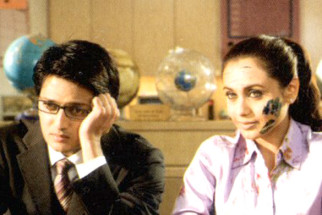KARAN JOHAR'S plots can typically be summed up with a one-liner question: Will Shah Rukh Khan get together with X? Will Shah Rukh Khan get together with Kajol (in Kuch Kuch Hota Hai)? Will Shah Rukh Khan get together with his estranged family (in Kabhi Khushi Kabhie Gham)? And so, as Kabhi Alvida Naa Kehna – or KANK, as it's come to be known – began to unfold, and I saw that its one-line plot is whether Shah Rukh Khan (playing Dev) will get together with Rani Mukerji (as Maya), I thought this was going to be just another milking of the same, old formula. I expected a few surprises, sure, for Johar is nothing if not an expert at spinning fresh variations on familiar clichés – that's why those who don't care for clichés don't care for Johar's cinema – but what I didn't expect is Bollywood's most mature, most messy romance since the younger Sridevi set eyes on father-figure Anil Kapoor in Lamhe.
The messiness is due to the fact that Dev and Maya are both married – to fashion-magazine-editor Ria (Preity Zinta) and PR guy Rishi (Abhishek Bachchan) respectively – and the maturity is because their spouses aren't Ranjeet and Bindu clones who drink and smoke and sleep around. It's quite the opposite, really – Ria loves Dev, and Rishi loves Maya. But like in all marriages, problems crop up, and that's when Dev and Maya begin a tentative friendship, only to realise they may actually be made for each other. And here's the kicker: they're made for each other because they're the losers in their respective marriages. They're the cowards, the ones with the hang-ups, the ones who'd rather wallow and seethe inside than take a step to set things right outside. Even when they start seeing each other, they do it so bloodlessly, it comes as no surprise when Maya gives Dev a kiss and immediately wipes the traces of lipstick off his cheek. They barely seem capable of acknowledging this relationship to themselves, let alone others.
When was the last time you saw a big, commercial, name-heavy Hindi movie where the hero and the heroine are portrayed as less charismatic, less fun, more whiny and weepy than the supporting characters (in this case, the people they are married to)? I can't remember – and that's just one of the ways KANK messes with your expectations of whom to identify with, whom to root for. Maya has a monster chip on her shoulder about being childless, and that's probably why she treats Rishi like a child – cleaning up after him, chiding him for not being serious, and possibly being more than a little envious about the carefree way he goes through life. Dev too has the weight of the world on his shoulders. He was once a star soccer player, but after an accident, he's reduced to being a soccer coach for a little league team, and he resents that Ria is more successful than he is. As opposed to these mopey sad-sacks, Rishi and Ria are so full of positive energy, so accepting of life as it comes, you like them far more than you do Dev and Maya. Yes, you feel sorry that the latter have their problems, but you wish they'd get over them and get on with their lives – the way grownups do.
Then again, it\'s true that losers deserve love too, even if it\'s not the kind of love that\'s terribly exciting to watch unfold before your eyes. KANK is a very, very long movie – Johar really needs to get himself a more ruthless editor; he\'s never content to let a moment pass without lingering on it after the mood is long gone, nor is he happy with dialogue when he can instead have declarations lasting long after they\'ve made their point – and yet the length, after a while, began to feel somewhat right. Dev and Maya aren\'t the kind who\'d make tough decisions easily; it would seem that they would take a very long time to overcome their insecurities and their doubts and their wishy-washiness and take the positive step (for them) of breaking up their marriages, if they can bring themselves to do that at all. And I must tell you, for something that begins with such broad humour – some of it downright atrocious; some of it cannily reflective of how laughably pathetic Dev and Maya are – KANK so darkens in tone towards the end and becomes so gloomily unpredictable, I wasn\'t quite sure if Dev and Maya would ever end up together. This is a mainstream movie, and mainstream movie convention demands that the hero and heroine ride off (or fly off or sail off or take a train) into the sunset. But mainstream movie convention also demands that people don\'t walk out of marriages to loving spouses to pursue selfish affairs of the heart, and that our top stars don\'t risk audience alienation. Maya is played by our current Heroine No. 1 – the adorable Babli, for crying out loud! – so you wonder if the writers will fiddle around with her image by making her leave Rishi. She may not want to sleep with him anymore, but she still loves him (and, more importantly, he\'s besotted with her) – so will we be able to take her side if she decides to hurt him? After all, it isn\'t that he\'s wrong for her so much as he isn\'t right for her.
What's more startling is what they do with our Hero No. 1. Shah Rukh has always been the hero most in touch with his feminine side – the word for that these days, I think, is metrosexual – but he goes a step further in KANK and gives us a man who is borderline emasculated. Dev is filled with insecurity and resentment and petty jealousy (mostly towards Ria), and there's nothing he can do about it – at least till he meets Maya. The way I saw it, he's the classic Indian MCP who can't handle a hard-nosed career woman like Ria; he needs a soft, sensitive, sari-clad homemaker like Maya to make him feel like a man again. Even Maya's profession is non-threatening; she teaches little kids at a school. In contrast, Ria doesn't have the time to attend her own kid's soccer match; like overworked fathers usually do, she bribes the child with a PlayStation to say she's sorry. But KANK, remarkably, doesn't brand her a bitch. We actually sympathise with her when she observes, in one of the film's many pointed bits of dialogue, "Main Arjun ki maa nahin ban saki kyonki mujhe uska baap banna pada." (She couldn't be a mother to her child because she had to become the father.) Yet, under that necessary armour of steel, Ria is a woman. When Dev and Maya finally admit to their spouses that they are in love, Rishi flies into a rage and begins to break things around the house, while Ria remains calm and collected. Rishi wants to know if Maya enjoyed sleeping with Dev, but Ria asks Dev if he's in love with Maya; the man is more concerned with the sexual aspect of the betrayal while Ria, all woman, tries to come to grips with the emotional implications.
With all this, it\'s no surprise that Preity (looking quite spectacular) and Abhishek come off far better – even in their abbreviated parts – than Shah Rukh and Rani, who really aren\'t asked to do anything here that they haven\'t done earlier (and better). Bachchan Jr., in particular, is the great jolt of energy the movie sorely needs every once in a while. (Bachchan Sr. is there too, in a charming little role as a naughty old man who\'s the film\'s conscience.) Abhishek brings the house down in a couple of song sequences that are dazzlingly put together – especially the sixties\'-themed Rock N Roll Soniye, where he boogies with women costumed in billowing Marilyn Monroe skirts (you know, like in The Seven Year Itch) and figure-hugging Mumtaz saris (you know, like in Brahmchari\'s Aaj kal tere mere pyar ke charche). Shankar-Ehsaan-Loy\'s best number – Mitwa – is also nicely used to underline the growing friendship between Dev and Maya, but the title track is somewhat wasted. When it begins, everything around Maya and Dev turns blue, which we\'ve just learnt is her favourite colour. It\'s as if, having finally accepted her love for Dev, the world around her has become more to her liking – and then Johar kills the conceit by colour-coding the rest of the segments of the song in red and green and so on.\n
That overkill may be the undoing of Karan Johar, and I really wish he\'d stop self-referencing. (K3G\'s Bole choodiyan is played by a brass band for a wedding baraat, and a hospital sequence is straight out of Kal Ho Naa Ho, right down to the various visitors dropping in one by one to have farewell conversations with the patient.) But you can\'t deny that he\'s one of the very few young directors who\'s interested in – and who knows his way around – old-fashioned, Bollywood storytelling, where the emphasis is on emotion rather than reason, where the point of a scene isn\'t in drawing out truth or detailing reality but in the sensual experience of the moment: foreplay, climax, afterplay (or, if you will, buildup, detonation, cool-down). He knows that he has a dark story to tell, so he loads his first half with corny comedy, making us like his characters before we have reason to dislike them. He values the power of precisely-shaped words conveying the beating heart of an emotion with sledgehammer impact. He realises that part of the reason we\'re here is to see five-star stars getting the five-star treatment, so there\'s not a scene, not a shot that shows his actors as anyone remotely resembling us. Yet, the way Johar tells his story isn\'t old-fashioned at all; he uses spruced-up movie trickery as well as anyone else. When Rishi calls Maya to apologise for yelling at her, she\'s on the phone with her lover Dev, so Rishi leaves a voice message; Johar uses a split screen to simultaneously show both of them making their respective calls, and we simultaneously see one who\'s in the process of mending this marriage, the other in the process of breaking it. Who\'d have guessed that our prime purveyor of candy-coloured entertainment had it in him to process these shades of grey!

